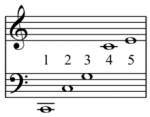
•→ http://photographicdictionary.com/body-parts ⇐
• Idioms related to the body . . . →[01] ⇔ [02] ⇔ [03] ⇔ [04]←
· · · click the parts for idioms . . . →[01]← / →[02]← / →[03]←
→[quiz 01]← / →[quiz 02]← [body idioms]
[…]
|
||||||

¤ Finite & Non-finite Verbs ←[pdf] ¤ Auxiliary Verbs ⇐ «Auxiliaries are required with non-finite verbs. This is their role to mark non-finite verb forms for tense, aspect and voice, which non-finite verbs cannot express. Finite verbs mark these features on their own.» (Bernard T. O’Dwyer, Modern English Structures: Form, Function) […] 
∴ Unlike Spaniards, who are prone to exaggeration in their everyday remarks, Britons (not Americans!) tend to prefer understatements. Take a movie: while it may well be appraised as ‘Great!’ or ‘Brilliant!‘ by a Spanish national, it might simply be assessed as ‘Not bad’ (not less appraisal to be inferred from the lips […] 
•→www.chompchomp.com/terms/antecedent.htm⇐ •→Pronouns vs. determiners⇐ • quiz→ ¤ DEMOSTRATIVES ‘THIS’ – ‘THAT’ ↓ ‘THESE’ – ‘THOSE’ ¤ PERSONALS – POSSESSIVES There’s a lot of English in this chart, with all these reference words. I my mine me myself you your yours you yourself he his his him himself […] ♣ Can you feel the pain? ↔aches & pains. •→PAIN collocations⇐ •→Physically painful ⇐[MacMillan Dictionary] ¤ English words and phrases connected with injury. Boil = infected swelling with liquid inside it: «You’ll need to go to the doctor to have that boil lanced.» (lance – puncture and clean) Lump […] 
Stress: an essential element of rhythm, which is the most distinctive feature of the English language. Word stress is not used in Japanese or Spanish, where each syllable is pronounced with eq-ual em-pha-sis. The biggest difference in the “music” of languages is the way we speak syllables. All languages can divide […] 
Intonation – Intonation is the rising and falling sounds of the voice when speaking. Intonation (Part 2) – Phrasing – In addition to the intonation of a statement, there is another aspect of speech that indicates meaning — phrasing. Intonation (Part 3) – Contrast – Once the intonation of new information is established, you’ll […] 
¤ A slide_share presentation: ↓ History of Advertising History of Advertising from Tugce Esener Φ The Language of Advertising . . .⇐ φ Advertising vocabulary quiz . . . ⇒ [01] ⇔ [02] ⇔ [03] ⇐ •→38-examples-of-great-visual-pun-in-advertising/⇐ ◊ Guinness 1994 ⇓ ‘We have all the time in the world’ […] 
♣ Negation ⇐(like asking) is one of the most difficult areas of English •→ Double Negatives⇐[a feature of Spaniards and Blacks] ∇ Transferred Negation When we express negative ideas with verbs like think, believe… we prefer to make the first verb negative instead of the second. We shift or transfer the […] |
||||||